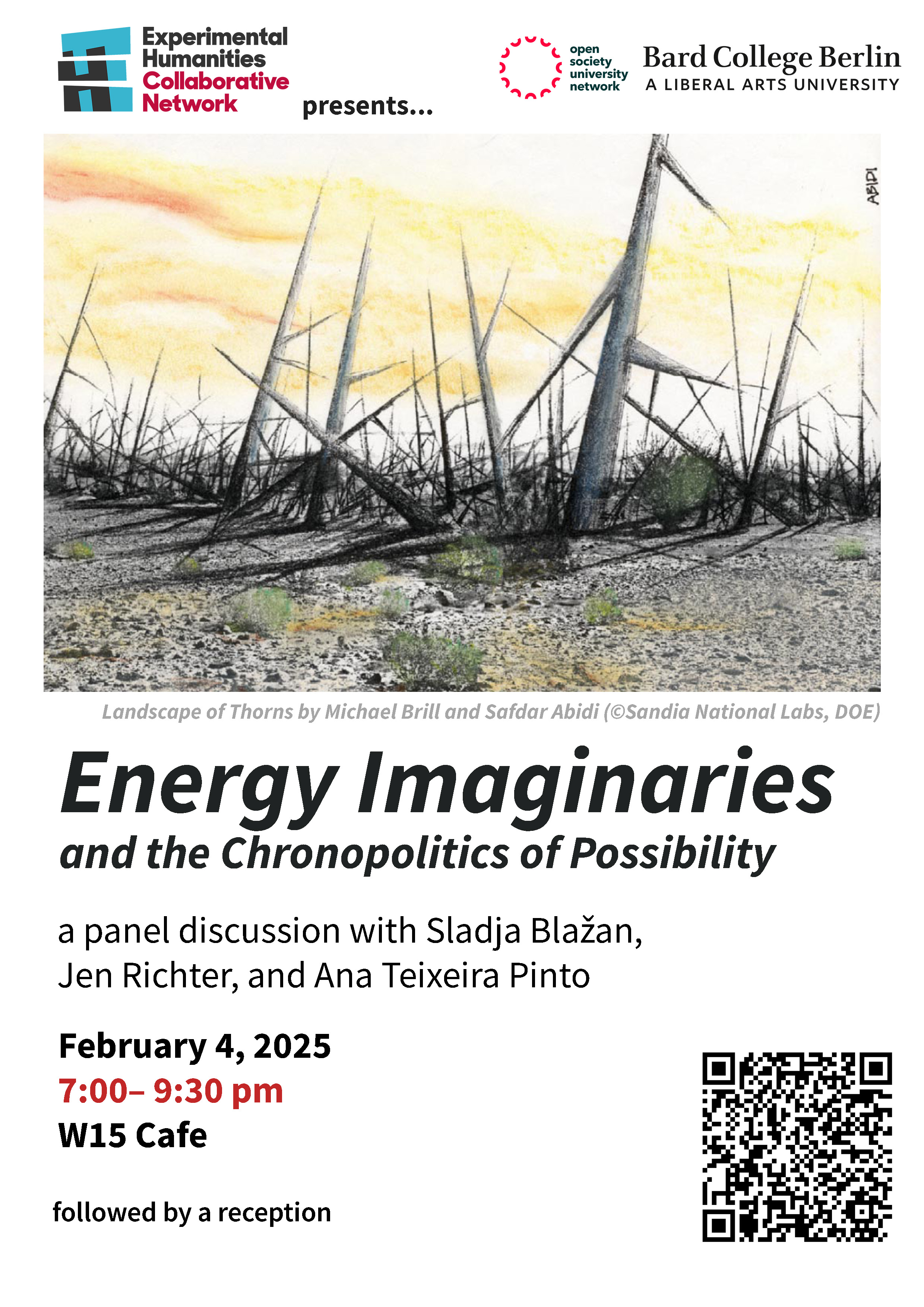
Energy Imaginaries and the Chronopolitics of Possibility
Tuesday, February 4, 2025
W15 Cafe
7:00 pm – 9:30 pm CET/GMT+1
From the eighteenth century onwards, western science began to tap a large, yet non-renewable, capital store of energy. This transition from agricultural production dependent upon the flow of annual cycles (the sun) to industrial production based on the usage and subsequent depletion of energy stocks (fossil fuels) peaked around 1860. The use and abuse of energy continue to directly impact the state of our planet and its life, so, naturally, energy transition and related future technologies are omnipresent topics. What is crucial to these discussions—yet has received far less attention so far—is the question of what kinds of futures energy production should make possible. What often stands in the way of energy imaginaries is the chronopolitics of energy. We “manage,” “kill,” “save,” and “steal” time, which, in most western cultures, is seen as linear. Our massive modern energy systems, with their attendant geopolitics, obscure the cyclical nature of time, which moves in seasons, on currents, and over much longer scales than human life. This panel discussion will frame time differently, exploring the flows of labor, capital, and resources that are constantly in flux around the globe, and examining what has driven these flows in the past and present in order to imagine better futures.7:00 pm – 9:30 pm CET/GMT+1
This event is presented by the Experimental Humanities Collaborative Network as part of the Thinking Towards Feminist Futures event series.
Jen Richter is an Associate Professor at Arizona State University, in Tempe, AZ, USA. She is jointly appointed between the School for the Future of Innovation in Society and the School of Social Transformation. Her research lies at the intersection of energy systems, policy, and justice, with specific focus on the nuclear fuel cycle, and informing equitable nuclear waste management for communities. She also works on projects related to direct air capture for carbon emissions in former coal communities, as well as solar energy for Maricopa County, the largest (and hottest!) county in Arizona. Richter has published in Energy Research & Social Science, as well as a co-authored book entitled Environmental Realism: Challenging Solutions, and also co-directs the student activist organization Local to Global Justice.
Ana Teixeira Pinto is a writer and cultural theorist based in Berlin. She is a professor at HBK Braunschweig and a theory tutor at the Dutch Art Institute. She is the editor of the book series On the Antipolitical and co-editor of Fascism, Unreason and the Paradox of Modernity, both published by Sternberg Press.
Sladja Blažan received her PhD in North American Literature and Culture from Humboldt University Berlin and her Habilitation in American Studies from University Würzburg. She has taught as a professor for Literature and Media Cultures at Philipps-Universität Marburg, Bard College Berlin/Annandale-on-Hudson, New York University, Free University Berlin, Dutch Art Institute, Humboldt University Berlin and University College Dublin. Research areas include speculative fiction, critical posthumanism, environmental humanities, and critical refugee studies. Her book Ghosts and Their Hosts: The Colonization of the Invisible World was published last month with University of Virginia Press. Other publications include the edited collection Haunted Nature: Entanglements of the Human and the Nonhuman, the manuscript American Fictionary: Postsozialistische Migration in der U.S. Amerikanischen Literatur and numerous articles on the intersection of race, gender and class issues.
Time: 7:00 pm – 9:30 pm CET/GMT+1
Location: W15 Cafe